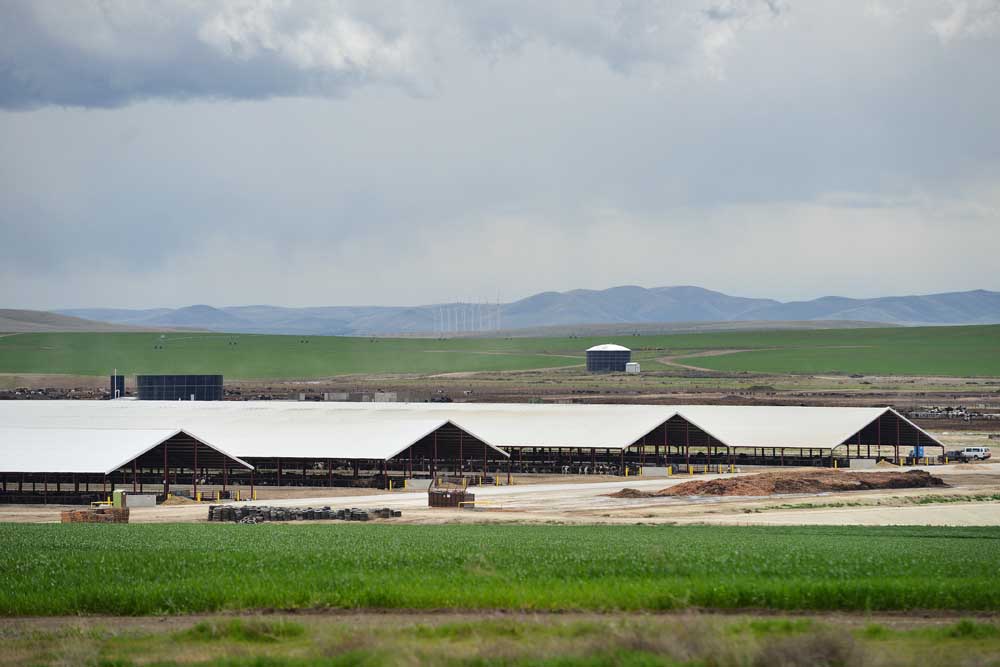ONLINE Dan Fulleton Farm Equipment Retirement Auction
THIS WILL BE AN ONLINE AUCTION Visit bakerauction.com for full sale list and information Auction Soft Close: Mon., March 3rd, 2025 @ 12:00pm MT Location: 3550 Fulleton Rd. Vale, OR […]
Published 7:39 am Wednesday, June 27, 2018

Oregon regulators announced Wednesday they are revoking the waste management permit for Lost Valley Farm, a controversial and oft-troubled dairy producer that once sought to have 30,000 cows near Boardman.
The revocation comes just 15 months after the facility first received its permit from the Oregon Department of Agriculture and Department of Environmental Quality, which jointly manage the state’s confined animal feeding operation, or CAFO, program. Lost Valley now has 60 days to shut down, move all its animals and clean all waste systems.
Among the issues with Lost Valley and its owner, Greg te Velde, the agencies claim the dairy repeatedly violated terms of its wastewater discharge permit, putting the environment and human health at risk. The facility also lacks the infrastructure to handle the amount of manure it generates, and has failed to keep accurate records, according to ODA and DEQ.
“Over the last year we have used every regulatory tool available including civil penalties to gain compliance,” said ODA Director Alexis Taylor in a statement. “We believe the owner is not willing or unable to meet the conditions of his permit that helps protect human health and the environment.”
Te Velde did not immediately return calls for comment. He may appeal the revocation within 60 days and request a contested case hearing before an administrative judge.
Lost Valley was poised to become the second-largest dairy in Oregon, behind neighboring Threemile Canyon Farms. In 2002, te Velde established Willow Creek Dairy on land leased from Threemile Canyon, selling milk to Columbia River Processing, a subsidiary of Tillamook County Creamery Association at the Port of Morrow.
By 2015, te Velde was ready to strike out on his own, purchasing 7,288 acres of the former Boardman Tree Farm to start his new business. After a lengthy and contentious hearing process that garnered more than 4,200 public comments, ODA and DEQ granted Lost Valley a permit to handle roughly 187 million gallons of liquid manure each year.
Almost immediately, the dairy began racking up permit violations related to discharging liquid and solid waste. Lost Valley is within the Lower Umatilla Basin Groundwater Management Area, established in 1990 by DEQ due to elevated groundwater nitrates.
ODA sued to shut down Lost Valley in March, and while that case was ultimately settled, the state claims the dairy continued to defy its permit. The notice of revocation notes that the facility violated specific conditions related to waste storage at least 32 times from June 28, 2017, to May 9, 2018, along with a laundry list of other infractions related to maintenance and record-keeping.
“(Lost Valley’s) numerous, repeated and serious permit violations have allowed wastewater and manure to be placed directly on the soil and land surfaces where they are likely to leach into groundwater,” the document states. “The ODA has information that leads it to conclude that violation of the permit’s terms, even absent an indication that nitrate levels in the groundwater have increased, pose a threat to human health or welfare.”
Wym Matthews, who manages the Oregon CAFO program, said revocation is an extremely rare step for the agency to take. Of 509 facilities and 880 inspections in 2017, less than 1 percent resulted in violations that led to civil penalties or injunctive relief.
“It’s an extremely low percentage of activities for us to get to this point,” Matthews said.
Lauren Goldberg, staff attorney with the environmental group Columbia Riverkeeper, said the decision was a common-sense move to protect Oregonians’ right to clean water.
“This facility never should have had the green light to operate in Oregon,” Goldberg said. “Now is the time to step back and learn lessons to make sure this public health and environmental disaster never happens again.”
Losing its state permit is just the latest in a string of trouble for Lost Valley and te Velde.
Earlier this year, Rabobank, an agricultural lender, moved to auction the entire dairy herd as collateral, claiming te Velde owes $67 million in loans and $162 million in total debt. The sale was forestalled in April after te Velde declared Chapter 11 bankruptcy protection, allowing him to try to reorganize the dairy’s finances.
Matthews said he cannot comment on how the revocation will affect the bankruptcy proceedings.
In a previous court filing, Rabobank claimed te Velde’s “erratic” behavior was due to “habitual” use of methamphetamine. Te Velde was arrested and charged with possession of methamphetamine in Richland, Wash. in August 2017, though he has stated in court documents that he has since enrolled in a treatment program.
Te Velde is now trying to sell the dairy and his cattle, though Columbia River Processing is suing to terminate its milk buying contract, which Rabobank cited as a reason to lift bankruptcy protections and allow the cattle auction to move forward.